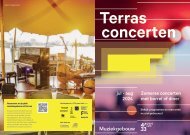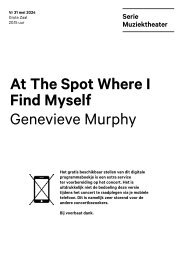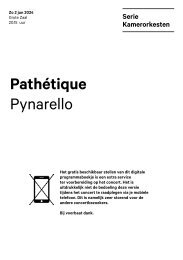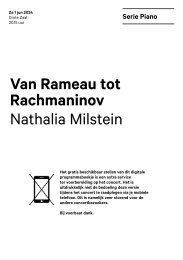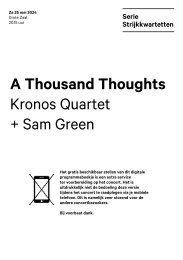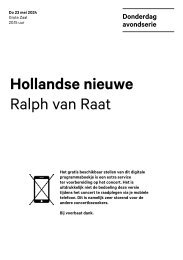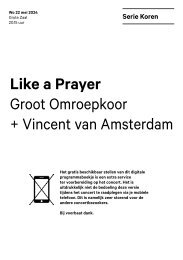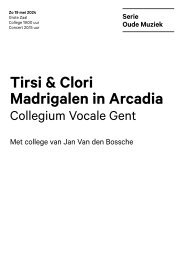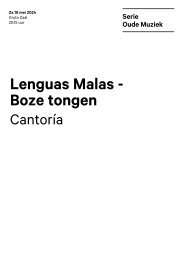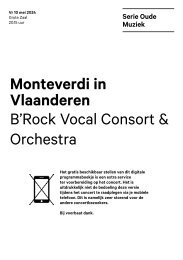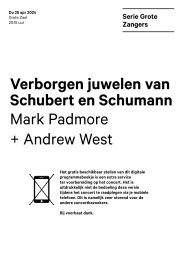You also want an ePaper? Increase the reach of your titles
YUMPU automatically turns print PDFs into web optimized ePapers that Google loves.
Do <strong>17</strong> nov <strong>2022</strong><br />
Grote Zaal<br />
20.15 uur<br />
Donderdag<br />
avondserie<br />
<strong>Stimmung</strong> <strong>III</strong><br />
<strong>Silbersee</strong><br />
Het gratis beschikbaar stellen van dit digitale<br />
programmaboekje is een extra service<br />
ter voorbereiding op het concert. Het is<br />
uitdrukkelijk niet de bedoeling deze versie<br />
tijdens het concert te raadplegen via je mobiele<br />
telefoon. Dit is namelijk zeer storend voor de<br />
andere concertbezoekers.<br />
Bij voorbaat dank.
Programma<br />
<strong>Stimmung</strong> <strong>III</strong><br />
<strong>Silbersee</strong><br />
<strong>Silbersee</strong><br />
Fanny Alofs<br />
Stefanie Bruggeling<br />
Jennifer Van Der Hart<br />
Elisabeth Hetherington<br />
Georgi Sztojanov<br />
Lukasz Wilda<br />
Arjan Lienaerts<br />
Maciej Straburzynski<br />
Donderdag<br />
avondserie<br />
Do <strong>17</strong> nov <strong>2022</strong><br />
Grote Zaal<br />
20.15 – 21.30 uur<br />
ca. 75 minuten zonder pauze<br />
Inleiding<br />
Foyerdeck 1<br />
19.15 – 19.45 uur<br />
Door Michel Khalifa<br />
Romain Bischoff dirigent<br />
Jeroen Smith lichtscenografie<br />
Romain Bischoff, Niels Kingma lichtontwerp<br />
Kate Moore lier<br />
Benjamin Britten (1913 - 1976)<br />
Five Flower Songs op. 47 (1950)<br />
1. To Daffodils<br />
2. The Succession of the Four Sweet Months<br />
3. Marsh Flowers<br />
4. The Evening Primrose<br />
5. The Ballad of Green Broom<br />
Hymn to St. Cecilia (1941-1942, rev. 1966)<br />
Kate Moore (1979)<br />
Rosae et lilia: portraits of St. Cecilia (1921)<br />
1. Child<br />
2. Father<br />
3. The Sanctuary<br />
4. The Coming of Age<br />
5. The Lovers<br />
6. The Dark Passage of Time<br />
7. Lady of the Fields<br />
Staat je mobiele telefoon al uit?<br />
Dank je wel.<br />
2
Toelichting<br />
In <strong>Stimmung</strong> <strong>III</strong> presenteert <strong>Silbersee</strong> muziek van Benjamin Britten en Kate Moore waarin St.<br />
Cecilia een centrale rol speelt. De serie <strong>Stimmung</strong>, waarvan dit het derde deel is, combineert<br />
steeds iconische werken voor zang uit de twintigste eeuw met nieuwe composities.<br />
De heilige Cecilia had voor Benjamin Britten<br />
een speciale betekenis. Niet alleen omdat<br />
ze de patroonheilige is van de muziek en<br />
musici, maar ook omdat hij geboren werd op<br />
haar feestdag 22 november. Hij zag zichzelf<br />
als voorbestemd om zich actief met muziek<br />
te gaan bezighouden. Behalve componist<br />
was hij pianist en dirigent. <strong>Silbersee</strong> brengt<br />
twee a-capellacomposities van Britten. Naast<br />
zijn grootse Hymn to St. Cecilia (op een<br />
gedicht van W.H. Auden) staat Five Flower<br />
Songs op het programma. Hij schreef het ter<br />
gelegenheid van het zilveren huwelijk van<br />
Leonard en Dorothy Elmhirst, die zijn werk<br />
financieel ondersteund hadden, en grote<br />
plantenliefhebbers waren.<br />
Het werk van Kate Moore sluit hier direct bij<br />
aan. Zij heeft zich in haar muziek de laatste<br />
jaren vaker laten inspireren door vrouwen<br />
met een religieus spirituele achtergrond.<br />
Veel van haar werken hebben de natuur en<br />
de zorg om het natuurlijk evenwicht op onze<br />
planeet als onderwerp. Die twee thema’s<br />
komen samen in zeven tableaus die ze rond<br />
Cecilia heeft gecomponeerd, vergelijkbaar<br />
met de middeleeuwse wagenspelen. Ze heeft<br />
die – heel toepasselijk – geschreven in een<br />
stijl waarin vroege muziek en volksmuziek<br />
doorklinken. De tableaus vertegenwoordigen<br />
de levenscyclus, van geboorte tot de dood.<br />
In deze productie heeft <strong>Silbersee</strong> gekozen<br />
voor een duurzame aanpak in het lichtontwerp<br />
van Jeroen Smith. Hij maakt lampen<br />
van maiszetmeel en restmaterialen, die<br />
gebaseerd zijn op driedimensionale scans van<br />
bloemen. In het toneelbeeld van <strong>Stimmung</strong><br />
<strong>III</strong> zitten lampen die vanwege foutjes in het<br />
procedé niet geschikt zijn voor privégebruik.<br />
Benjamin Britten<br />
Five Flower Songs<br />
Britten schreef Five Flower Songs als<br />
geschenk aan mecenassen Leonard en<br />
Dorothy Elmhirst ter gelegenheid van<br />
hun zilveren huwelijk. De Elmhirsts<br />
ondersteunden onder meer de English<br />
Opera Group, in 1947 opgericht door<br />
Britten.<br />
Omdat ze grote liefhebbers waren van<br />
bloemen, koos hij vijf gedichten van<br />
schrijvers uit verschillende periodes die<br />
bloemen als onderwerp hadden. Het zijn<br />
muzikale vignetten, korte tableaus met<br />
een symbolische strekking en een morele<br />
boodschap. De eerste twee teksten zijn<br />
van de zeventiende-eeuwse dichter Robert<br />
Herrick. To Daffodils heeft vergankelijkheid<br />
als onderwerp, terwijl The Succession of<br />
the Four Sweet Months in kort bestek een<br />
steeds grotere bloei en weelde beschrijft in<br />
de laatste twee maanden van de lente en<br />
de eerste twee maanden van de zomer. Ook<br />
de teksten van de latere dichters George<br />
Crabbe en John Clare – Marsh Flowers en<br />
3
Toelichting<br />
Evening Primrose – contrasteren met elkaar.<br />
Net als Britten geboren in East Suffolk<br />
schreef Crabbe over het landschap en de<br />
bewoners van deze kuststreek, onder meer<br />
in The Borough, een gedicht dat als basis<br />
diende voor Brittens opera Peter Grimes.<br />
Uit datzelfde gedicht haalde Britten regels<br />
voor Marshflowers, een beschrijving van de<br />
ruige natuur van de streek. Daar tegenover<br />
staat het ingetogen, idyllische karakter<br />
van Evening Primrose. Britten heeft die<br />
verschillen in sfeer verwerkt in de muziek.<br />
Hij sluit af met een opgewekte volksballade<br />
rond het motief van een arme jongen die met<br />
een jonge dame van stand trouwt. Gezongen<br />
imitaties van gitaarakkoorden begeleiden de<br />
volkse melodie die het verhaal vertelt.<br />
Hymn to St. Cecilia<br />
Britten wilde al jarenlang een ode<br />
schrijven aan de heilige Cecilia, in een<br />
traditie die teruggaat tot Henry Purcell<br />
en Georg Friedrich Händel. Hij werd ervan<br />
weerhouden doordat hij geen geschikte<br />
tekst kon vinden. Uiteindelijk vroeg hij W.H.<br />
Auden, die hij in 1935 had leren kennen, om<br />
een gedicht.<br />
Het werd een tekst vol complexe beelden en<br />
verwijzingen. De drie delen verschillen sterk<br />
van elkaar, in tekst en muziek, maar sluiten<br />
steeds af met dezelfde regels, waarin de<br />
dichter Cecilia oproept om in componisten<br />
een onsterfelijk vuur te laten ontbranden.<br />
Dat afsluitende refrein krijgt aan het eind van<br />
elk deel een andere behandeling.<br />
In het eerste deel stelt Auden de<br />
‘onschuldige, maagdelijke’ heilige eerst<br />
voor als een zwarte zwaan die op het<br />
moment van haar sterven begint te zingen,<br />
en vervolgens als een Aphrodite die naakt<br />
op een oesterschelp oprijst uit de zee,<br />
een overduidelijke verwijzing naar het<br />
bekende schilderij van Sandro Botticelli.<br />
De stemmen worden gedragen door een<br />
trage melodie die tussen de tenoren en de<br />
bassen heen en weer beweegt. Het tweede<br />
deel benadrukt de ongrijpbare directheid<br />
van muziek. Opnieuw klinkt de langzame<br />
melodie in de mannenstemmen, maar daar<br />
overheen buitelen de andere zangers in<br />
een snelle canon, die contrasteert met<br />
het refrein. Dat is statig, als een gedragen<br />
kerkhymne. Het derde deel is ongeveer<br />
even lang als de twee voorgaande.<br />
Aanvankelijk bewegen de stemmen zich<br />
over een neergaande lijn van de mannen<br />
die in elke regel herhaald wordt. Het<br />
tweede couplet markeert het begin van<br />
solopartijen, die uitmonden in het motief,<br />
waar het stuk mee begon en dat ook steeds<br />
terugkeerde in het refrein. De tekst van de<br />
eerste twee coupletten is veel cryptischer<br />
dan de rest van het gedicht. In het derde<br />
couplet passeren, zoals gebruikelijk is<br />
in odes aan de heilige Cecilia, de vier<br />
belangrijkste instrumentgroepen de revue:<br />
strijkers, slagwerk, hout- en koperblazers.<br />
Het gedicht kan overigens geïnterpreteerd<br />
worden als een aansporing van de<br />
homoseksueel Auden aan Britten om zich<br />
te bevrijden van zijn puriteinse houding<br />
tegenover zijn eigen geaardheid.<br />
4
Toelichting<br />
Kate Moore<br />
Rosae et lilia: portraits of St. Cecilia<br />
In Rosae et lilia: portraits of St. Cecilia<br />
grijpt Kate Moore terug op oude tradities.<br />
Het stuk is verdeeld in zeven tableaus,<br />
vergelijkbaar met middeleeuws theater<br />
waarin de vertelling belangrijker is dan het<br />
uitbeelden van handelingen. De tableaus<br />
volgen het leven van de derde-eeuwse<br />
heilige Cecilia, zoals dat overgeleverd is.<br />
Feitelijk is vrijwel niets over Cecilia<br />
bekend. Ze zou na haar huwelijk met een<br />
edelman maagd hebben willen blijven. Hij<br />
respecteerde de wens en zag een engel<br />
die haar kroonde met een krans van rozen<br />
en lelies, symbolen voor liefde en leven<br />
enerzijds, en anderzijds zowel puurheid<br />
als de dood. Volgens een christelijke<br />
overlevering was haar lichaam meer dan<br />
duizend jaar na haar dood nog intact.<br />
Het stuk begint in een veld vol bloemen, en<br />
eindigt met een moeder in een winters veld,<br />
wanhopig op zoek naar haar dochter. Ze<br />
hoort het diepe ruisen van de wind in kale<br />
takken en ziet kalveren verschijnen, terwijl<br />
boven haar de melkweg straalt, die het<br />
begin van nieuw leven verbeeldt. Volgens<br />
de overlevering eiste een centurion dat ze<br />
Romeinse goden vereerde. Ze weigerde,<br />
omdat ze niet wilde knielen voor brokken<br />
steen. In The Sanctuary klinkt onder het<br />
verhaal de tekst van Psalm 24, waarmee<br />
Moore verwijst naar de puurheid van<br />
Cecilia. Moore, die de zangers van <strong>Silbersee</strong><br />
begeleidt met akkoorden op een lier, heeft<br />
de muziek gebaseerd op middeleeuwse<br />
meerstemmigheid en Engelse volksmuziek.<br />
Daarnaast klinken in het zesde deel The<br />
Dark Passage of Time vingerbekkens en<br />
een eenvoudig orgel dat een steeds verder<br />
uitgebreid akkoord produceert.<br />
René van Peer<br />
Tegelijkertijd zijn de tableaus verbonden aan<br />
de jaarcyclus van lente naar winter, van dood<br />
en wederopstanding, zoals die belichaamd<br />
wordt in de Griekse vruchtbaarheidsgodin<br />
Demeter, verantwoordelijk voor groei en<br />
bloei van planten. Op zoek naar haar dochter<br />
Persephone, die geschaakt is door de god<br />
van de onderwereld Hades, verwaarloost<br />
ze haar taak, waardoor de natuur afsterft.<br />
Volgens een afspraak met Hades keert haar<br />
dochter steeds voor een half jaar terug uit<br />
de onderwereld, de maanden van groei en<br />
oogst.<br />
5
Liedteksten<br />
Benjamin Britten<br />
Five Flower Songs<br />
1. To Daffodils<br />
Tekst: Robert Herrick (1591 – 1674)<br />
Fair daffodils, we weep to see<br />
You haste away so soon;<br />
As yet the early rising sun<br />
Has not attained his noon.<br />
Stay, stay,<br />
Until the hasting day<br />
Has run<br />
But to evensong;<br />
And, having prayed together,<br />
We will go with you along.<br />
Fair daffodils<br />
We have short time to stay; as you.<br />
We have as short a Spring;<br />
As quick a growth to meet decay,<br />
As you, or anything.<br />
You haste away so soon.<br />
We die,<br />
As your hours do, and dry away<br />
Like to the Summer’s rain;<br />
Or as the pearls of morning’s dew<br />
Ne’er to be found again.<br />
Next enters June and brings us more<br />
Gems than those two that went before,<br />
Then (lastly), July comes and she more<br />
Wealth brings in than all those three.<br />
3. Marsh Flowers<br />
Tekst: George Crabbe (<strong>17</strong>54 – 1832)<br />
Here the strong mallow strikes her slimy root,<br />
Here the dull nightshade hangs her deadly<br />
fruit,<br />
On hills of dust the henbane’s faded green,<br />
And pencil’d flower of sickly scent is seen,<br />
Here on its wiry stem, in rigid bloom,<br />
Grows the salt lavender that lacks perfume,<br />
At the wall’s base the fiery nettle springs<br />
With fruite globose and fierce with poison’d<br />
stings;<br />
In ev’ry chink delights the fern to grow<br />
With glossy leaf and tawny bloom below;<br />
The few dull flowers that o’er the place are<br />
spread<br />
Partake the nature of their fenny bed,<br />
These, with our seaweeds rolling up and<br />
down,<br />
Form the contracted Flora of our town.<br />
2. The Succession of the Four Sweet<br />
Months<br />
Tekst: Robert Herrick<br />
First, April, she with mellow showers<br />
Opens the way for early flowers,<br />
Then after her comes smiling May<br />
In a more rich and sweet array,<br />
6
Liedteksten<br />
4. The Evening Primrose<br />
Tekst : John Clare (<strong>17</strong>93 – 1864)<br />
When once the sun sinks in the west,<br />
And dewdrops pearl the evening’s breast;<br />
Almost as pale as moonbeams are,<br />
Or its companionable star,<br />
The evening primrose opes anew<br />
Its delicate blossoms to the dew<br />
And, hermitlike, shunning the light,<br />
Wastes its fair bloom upon the night;<br />
Who, blindfold to its fond caresses,<br />
Knows not the beauty he possesses.<br />
Thus it blooms on while night is by;<br />
When day looks out with open eye,<br />
’Bashed at the gaze it cannot shun,<br />
It faints and withers and is gone.<br />
5. Ballad of Green Broom<br />
Tekst: anoniem<br />
There was an old man liv’d out in the wood,<br />
And his trade was a-cutting of Broom, green<br />
Broom,<br />
He had but one son without thought, without<br />
good,<br />
Who lay in his bed till ’twas noon, bright<br />
noon.<br />
He sharpen’d his knives, and for once he<br />
contrives<br />
To cut a bundle of Broom, green Broom.<br />
When Johnny pass’d under a Lady’s fine<br />
house,<br />
Pass’d under a Lady’s fine room, fine room,<br />
She call’d to her maid: ‘Go fetch me’, she said,<br />
‘Go fetch me the boy that sells Broom, green<br />
Broom.’<br />
When Johnny came in to the Lady’s fine<br />
house,<br />
And stood in the Lady’s fine room, fine room,<br />
‘Young Johnny,’ she said, ‘Will you give up<br />
your Trade<br />
And marry a Lady in bloom, full bloom?’<br />
Johnny gave his consent, and to church they<br />
both went,<br />
And he married the Lady in bloom, full bloom.<br />
At market and fair, all folks do declare<br />
There’s none like the Boy that sold Broom,<br />
green Broom<br />
The old man awoke one morning and spoke,<br />
He swore he would fire the room, that room,<br />
If his John would not rise and open his eyes<br />
And away to the wood to cut the Broom,<br />
green Broom.<br />
So Johnny arose and slipp’d on his clothes<br />
And away to the wood to cut Broom, green<br />
Broom,<br />
7
Liedteksten<br />
Hymn to St Cecilia<br />
Tekst: W.H. Auden (1907 – 1973)<br />
I<br />
In a garden shady this holy lady<br />
With reverent cadence and subtle psalm,<br />
Like a black swan as death came on<br />
Poured forth her song in perfect calm:<br />
And by ocean’s margin this innocent virgin<br />
Constructed an organ to enlarge her prayer,<br />
And notes tremendous from her great engine<br />
Thundered out on the Roman air.<br />
Blonde Aphrodite rose up excited,<br />
Moved to delight by the melody,<br />
White as an orchid she rode quite naked<br />
In an oyster shell on top of the sea;<br />
At sounds so entrancing the angels dancing<br />
Came out of their trance into time again,<br />
And around the wicked in Hell’s abysses<br />
The huge flame flickered and eased their pain.<br />
Blessed Cecilia, appear in visions<br />
To all musicians, appear and inspire:<br />
Translated Daughter, come down and startle<br />
Composing mortals with immortal fire.<br />
II<br />
I cannot grow;<br />
I have no shadow<br />
To run away from,<br />
I only play.<br />
I cannot err;<br />
There is no creature<br />
Whom I belong to,<br />
Whom I could wrong.<br />
I am defeat<br />
When it knows it<br />
Can now do nothing<br />
By suffering.<br />
All you lived through,<br />
Dancing because of you<br />
No longer need it<br />
For any deed.<br />
I shall never be<br />
Different. Love me.<br />
Blessed Cecilia, appear in visions<br />
To all musicians, appear and inspire:<br />
Translated Daughter, come down and startle<br />
Composing mortals with immortal fire.<br />
<strong>III</strong><br />
O ear whose creatures cannot wish to fall,<br />
O calm of spaces unafraid of weight,<br />
Where Sorrow is herself, forgetting all<br />
The gaucheness of her adolescent state,<br />
Where Hope within the altogether strange<br />
From every outworn image is released,<br />
And Dread born whole and normal like a beast<br />
Into a world of truths that never change:<br />
Restore our fallen day; O re-arrange.<br />
O dear white children casual as birds,<br />
Playing among the ruined languages,<br />
So small beside their large confusing words,<br />
So gay against the greater silences<br />
Of dreadful things you did: O hang the head,<br />
Impetuous child with the tremendous brain,<br />
O weep, child, weep, O weep away the stain,<br />
Lost innocence who wished your lover dead,<br />
Weep for the lives your wishes never led.<br />
8
Liedteksten<br />
O cry created as the bow of sin<br />
Is drawn across our trembling violin.<br />
O weep, child, weep, O weep away the stain.<br />
O law drummed out by hearts against the still<br />
Long winter of our intellectual will.<br />
That what has been may never be again.<br />
O flute that throbs with the<br />
thanksgivingbreath<br />
Of convalescents on the shores of death.<br />
O bless the freedom that you never chose.<br />
O trumpets that unguarded children blow<br />
About the fortress of their inner foe.<br />
O wear your tribulation like a rose.<br />
Blessed Cecilia, appear in visions<br />
To all musicians, appear and inspire:<br />
Translated Daughter, come down and startle<br />
Composing mortals with immortal fire.<br />
9
Liedteksten<br />
Kate Moore<br />
Rosae et lilia: Portraits of St. Cecilia<br />
I. Child<br />
Child upon who butterflies rest with a dress<br />
of woven poppies, that was a gift from the<br />
gentle lady of the fields, a wise woman<br />
who taught you to reap and sew and sing<br />
flowers to bloom. She was your teacher<br />
and your mother and you were her devoted<br />
daughter with heira-botanea around your<br />
neck, weaving daisy chains in the fields and<br />
picking flowers to make a crown, skipping<br />
with sisters in a ring in the grass, singing<br />
tunes with the shepherd boys with a voice as<br />
clear as can be. The field is filled with reeds<br />
humming gently in the breeze. The harmony<br />
of the spheres in fourths and fifths and thirds.<br />
Purple crocuses softly bending in the breeze,<br />
blowing golden breath from tiny flowery<br />
lungs. Standing sentry, the guardian of the<br />
heath, a chestnut tree, watching circumspect.<br />
Its fallen pods on the ground and gathered<br />
in a sack to be roasted on a fire with honey,<br />
olive oil, vine leaves and fruit, nectar tears,<br />
vermillion flowers, fragrant herbs.<br />
II. Father<br />
There was a merchant from the east with<br />
goods of tin held in his hand, a set square<br />
to set for navigating. He stood upon an<br />
anchored ship, in a lightning storm in the<br />
harbour. He bid the guardian of the walls<br />
to grant him access to the city within.<br />
They asked him what he could bring. What<br />
could he offer in exchange. The Roman<br />
took advantage. He saw an opportunity. He<br />
asked the merchant for his most beloved<br />
possession. Could a father give away his<br />
daughter to live free?<br />
<strong>III</strong>. The Sanctuary<br />
A girl attends the sanctuary on the other<br />
side of the river on a hill. She learns the law<br />
of sevens, the hierarchy of nines and the<br />
balance of a heart against a feather. With<br />
torches she lights vestibules frequented by<br />
the wise who spoke of The One in all and<br />
everything. She discovers the discernment<br />
of the intellect and the golden light of the<br />
soul. She watches the Clepsydra, a pierced<br />
vessel, a water-clock through which seeps<br />
fluid. She remembers the flow and stasis of<br />
the stars to keep the hours. She sings the<br />
river of melody with a water organ and lyre.<br />
She tames wild beasts with words to heal all<br />
and plays a sistrum to keep an hypnotic beat.<br />
She measures bushels of wheat and grain<br />
weighed in fair proportion tied with lengths<br />
of yarn. She keeps parchment in a scroll<br />
in an archive in a chest in a cell. She fasts<br />
for three days drinking only water from the<br />
well. She sacrifices the suckling she raised<br />
and loved. She serves round bread, strong<br />
wine in vessels of clay. She brews warm milk,<br />
chamomile, mint, barley. She embraces The<br />
One who tends the wounds of the fallen, who<br />
offers prayers before wielding a sword.<br />
10
Liedteksten<br />
IV. The Coming of Age<br />
A young man bears a torch of hawthorn. Its<br />
fruit resembles apples and this is a right of<br />
passage. This is a festival to celebrate the<br />
coming of age. The young man takes the<br />
hand of a maiden dressed in gold with flowers<br />
in her hair and is filled with the promise of<br />
youth. There is dancing at the feast, with<br />
musicians and laughter. All the young men<br />
dance with maidens until the moon is high in<br />
the sky. They dance dances that were taught<br />
to them by the law bearer, who watches for<br />
the keeping of the youth as they become<br />
adults. It is late summer and the light on the<br />
field is golden.<br />
I love learning and thinking and studying<br />
and writing and composing. I love argument<br />
and debate and reading about the lives<br />
of the sages. Every day I learn to see how<br />
everything is connected and in pursuit of<br />
wisdom I see true beauty that is constant<br />
and never fades or decays. This is the love I<br />
seek with all my heart. This is the love of true<br />
happiness within. It is not the love you talk of.<br />
It is not the love of lust or ambition or selfish<br />
desire or avarice. I see the pure love, the love<br />
that sets the soul free. And the maiden gave<br />
the boy a branch of the walnut tree.<br />
V. The Lovers<br />
The hay has been harvested and the smell<br />
of grasses infiltrates the air. “May I kiss you<br />
sweet maiden?” asks the boy who is now<br />
a man. And she says “Dear sweet friend of<br />
mine. I am still a child and the world is before<br />
me. I know not yet its ways I wish to follow<br />
and become a keeper of the law. Stay with<br />
me dear sweet friend of mine, because I like<br />
you very much but love me for who I am, my<br />
mind and my talents and not for my youthful<br />
looks which are fleeting and will not last. I<br />
want to attend a school of philosophy with<br />
a teacher that I hold dear. If you are inclined<br />
you can come too. My teacher welcomes<br />
you with open arms. If you come with a pure<br />
heart, you will learn to seek the light of truth,<br />
there on the straight road three miles out<br />
of town where we meet. You must answer a<br />
riddle correctly an become purified. You will<br />
know the true path of divine love”, and the<br />
boy asks if she loves her teacher. “Dear boy,<br />
<strong>11</strong>
Liedteksten<br />
VI. The Dark Passage of Time<br />
There is a maiden on a rock. She faces The<br />
Roman in the darkness of the cave. They<br />
are strangers to each other. She had found<br />
the flowers of narcissus in her beloved field<br />
and had mistaken them for snowdrops. She<br />
picked them lovingly and unknowingly. She<br />
was filled with the joy and the excitement of<br />
the spring. She did not realise that they were<br />
a trap that had been planted for her to find<br />
their reflection in a puddle. Their charm and<br />
allure were set to ensnare her with chains and<br />
bonds. As she reached out to touch them, he<br />
took her hand against her will taking control<br />
over her, holding her firmly in his grasp as her<br />
master and voice of authority.<br />
Do you know who I am maiden? I am He,<br />
that holds power of life and death. And they<br />
entered a dark passage of time. He flattered<br />
her and discarded her, charmed her then<br />
abandoned her so that when he was cruel,<br />
she craved his kindness and when he was<br />
kind, she forgot his cruelty. When she thought<br />
about her field, he would tempt her back<br />
by offering a festival in honour of her name,<br />
inviting all the powers to be and telling her<br />
that no one else would do that for her, no one<br />
else in the world loved her as much as he.<br />
And she was alone in this strange land. She<br />
knew not a single person aside from him and<br />
she had no coins to offer the ferryman to<br />
cross the river home. She began to believe<br />
that she could not survive without him and<br />
relied on him for everything. He would tell her<br />
that she played music out of tune and she<br />
believed him and packed her instrument away<br />
for a decade daring not to touch it lest she<br />
offend him. She fell silent and sang no more.<br />
VII. Lady of the Fields<br />
My dear daughter, why do you not come<br />
home? I weep in the fields and see you in the<br />
shadows but where I expect to see you, the<br />
branches shudder with emptiness, the wind<br />
blows the grasses and whispers and moans,<br />
but your voice has been stilled and hidden<br />
away. I feel cold. My hair turns grey. My eyes<br />
sink into the recesses of my face. I retreat to<br />
the hollows of my skin. I wrap my body with<br />
wool. I cross the field, ankle deep in mud. I<br />
don’t know where you are, where have you<br />
gone? You cannot vanish so quickly leaving<br />
my side without word into thin air. They tell<br />
me that you never existed but I bore you<br />
from my body in pain and you were granted<br />
your first breath as I held you close and felt<br />
your warmth. I stand here where the roads<br />
meet. There is no one to hear my cry. I pound<br />
the resonant ground with my fist, and curse<br />
with an ache in my heart. I hear the echoes of<br />
you in the songs of the shepherds. I am sure<br />
they are the songs that you sang yourself. I<br />
try to remember them and how they went,<br />
to bring comfort to my soul, and memories<br />
of you drown out the inconsolable sadness<br />
within that chokes me.<br />
Old lady in the middle of the field with a<br />
sorrowful head upon her hands, the shapes<br />
and the shadows of the hedges are changing<br />
in the light remind her of the faces of cows.<br />
She imagines that they are ghosts of all<br />
the cows that have passed here, and they<br />
whisper to her gently from the realm of the<br />
Dead consoling her. They tell her that they<br />
too lost their offspring suddenly one day.<br />
Without explanation all the calves were gone.<br />
12
Liedteksten<br />
And their sadness rested here with their<br />
broken hearts. They mourn together in the<br />
twilight softly lowing laments through the<br />
Earth with deep voices that reverberate. The<br />
blue of the sky is darkening now and stars<br />
are beginning to appear. The Milky Way rises<br />
and the Ghost Cows lift their heads to pay<br />
respect to their Great Mother in the sky.<br />
They tell the lady that everything will be<br />
alright for her daughter is not dead, but will<br />
return one day like water from a spring. Her<br />
soul will rise and rise again with a fountain<br />
of love and they will embrace each other as<br />
lovers strung together for eternity.<br />
13
Biografieën<br />
Componisten<br />
Benjamin Britten<br />
Benjamin Britten (1913 -<br />
1976) wordt wel beschouwd<br />
als de grootste Engelse<br />
componist sinds Henry<br />
Purcell. Hij behoort tot de<br />
meest prominente klassieke<br />
componisten van de<br />
twintigste eeuw, met name<br />
op het gebied van vocale<br />
muziek.<br />
Voor zijn ontwikkeling<br />
op dit gebied was de<br />
samenwerking met de<br />
Engelse dichter W.H. Auden<br />
van groot belang. Britten<br />
begon zijn compositiestudie<br />
op twaalfjarige leeftijd bij<br />
Frank Bridge. Dankzij een<br />
beurs kon hij verder studeren<br />
aan het Royal College of<br />
Music in Londen. Hij brak in<br />
1937 door met Variations on<br />
a theme of Frank Bridge. Van<br />
1939 tot 1942 woonde Britten<br />
in de Verenigde Staten met<br />
zijn partner, de tenor Peter<br />
Pears, voor wie hij een groot<br />
aantal werken schreef. Hij<br />
kreeg definitieve erkenning<br />
in 1945 met de première<br />
van zijn tweede opera Peter<br />
14<br />
Grimes. In Aldeburgh, waar<br />
hij zich bij terugkomst uit de<br />
Verenigde Staten gevestigd<br />
had, richtte hij in 1948 het<br />
inmiddels wereldberoemde<br />
Aldeburgh Festival op.<br />
Britten was regelmatig in<br />
Nederland. Het Holland<br />
Festival bracht de eerste<br />
volledige uitvoering van zijn<br />
War Requiem. In 1976, het<br />
jaar van zijn dood, werd hij in<br />
de adelstand verheven.
Biografieën<br />
Kate Moore<br />
Kate Moore (1979) behaalde<br />
een doctorstitel aan het<br />
Conservatorium van<br />
Sydney, en voltooide de<br />
masteropleiding van het<br />
Koninklijk Conservatorium<br />
van Den Haag. Ook slaagde<br />
ze cum laude voor haar<br />
bachelor aan de Nationale<br />
Universiteit van Australië in<br />
Canberra.<br />
Centrale thema’s in haar<br />
werk zijn zorg voor de<br />
natuur, spiritualiteit<br />
en de rol van vrouwen<br />
in muziek en andere<br />
disciplines. Ze gebruikt<br />
ongewone klankbronnen<br />
in haar muziek, waaronder<br />
keramische objecten die<br />
ze zelf gemaakt heeft.<br />
Haar werk is uitgevoerd<br />
in de Carnegie Hall, het<br />
Sydney Opera House en het<br />
Koninklijk Concertgebouw te<br />
Amsterdam en op belangrijke<br />
festivals zoals het Holland<br />
Festival, November Music<br />
en Dag in de Branding. Ze<br />
werkte met diverse orkesten<br />
en ensembles, waaronder<br />
het Nederlands Radio<br />
Philharmonisch Orkest<br />
en Omroepkoor, Slagwerk<br />
Den Haag, Amsterdam<br />
Sinfonietta, Nieuw Ensemble,<br />
Bang on a Can All-Stars<br />
en Asko|Schönberg. In<br />
20<strong>17</strong> richtte ze het Herz<br />
Ensemble op. Moore heeft<br />
diverse prijzen ontvangen,<br />
foto: Marco Giugliarelli<br />
waaronder de Matthijs<br />
Vermeulen Prijs in 20<strong>17</strong> en de<br />
Gieskes-Strijbis Podiumprijs<br />
in <strong>2022</strong>.<br />
15
Biografieën<br />
Uitvoerenden<br />
<strong>Silbersee</strong><br />
<strong>Silbersee</strong>, in 2014<br />
opvolger van VocaalLab,<br />
omschrijft zichzelf als<br />
een caleidoscopisch<br />
gezelschap rond zanger<br />
Romain Bischoff. Van een<br />
werkplaats voor vocale<br />
muziek is het uitgegroeid<br />
16<br />
tot een productiekern<br />
voor interdisciplinair<br />
muziektheater.<br />
Het is geworteld in opera,<br />
maar staat open voor<br />
eigenzinnige talenten uit de<br />
meest uiteenlopende genres<br />
en disciplines. Met de stem<br />
als oer-instrument richt het<br />
zich op actuele thema’s,<br />
zoals inclusie, ecologie<br />
en artificiële intelligentie.<br />
<strong>Silbersee</strong> is altijd op zoek<br />
foto: Jan van den Bossche<br />
naar nieuwe kunstvormen,<br />
bijzondere kruisbestuivingen<br />
en onverwachte uitkomsten.<br />
Het wil een rol vervullen<br />
van voortrekker en<br />
vernieuwer, op artistiek<br />
en maatschappelijk vlak.<br />
Het streeft ernaar om in<br />
2027 een klimaatpositief<br />
productiehuis te zijn en<br />
geen enkel negatief effect<br />
meer te hebben op milieu, op<br />
grondstoffenvoorraden en op<br />
de samenleving.
Verwacht<br />
Spectrale muziek van<br />
Murail<br />
Ralph van Raat<br />
Als onvermoeibaar verkenner van ongebaande paden<br />
behoeft pianist Ralph van Raat nauwelijks introductie.<br />
In zijn nieuwste programma staan componisten<br />
centraal waarbij de muziek draait om de klank en het<br />
klankspectrum. Een ontdekkingstocht die zijn hoogtepunt<br />
vindt in de Franse stroming 'musique spectrale' met<br />
Tristan Murail als een van de boegbeelden. Van hem speelt<br />
van Raat enkele splinternieuwe werken. Die spiegelt hij<br />
met muziek van zijn voorgangers, van François Couperin<br />
tot Debussy en plaatst ze zo in historisch perspectief.<br />
De vier stukken van Murail stammen uit de laatste jaren en<br />
waren niet eerder in Nederland te horen. Op geheel eigen<br />
wijze verwerkt Murail in dit late werk zijn inspiratiebronnen.<br />
Zo klinken de pianowerken van Claude Debussy door<br />
in Cailloux dans l'eau (2018), en voor Mémorial putte<br />
hij inspiratie uit het Holocaustmonument in Berlijn. Op<br />
het programma staat ook een totaal onbekende Prélude<br />
van Olivier Messiaen. Wie benieuwd is naar alternatieve<br />
pianotradities of de geschiedenis van spectrale muziek is bij<br />
Van Raat aan het juiste adres.<br />
Donderdag<br />
avondserie<br />
Do <strong>17</strong> nov <strong>2022</strong><br />
Grote Zaal<br />
20.15 uur<br />
Ralph van Raat<br />
foto: Simon van Boxtel<br />
Programma: Claude Debussy Quelques aspects de Nous<br />
n'irons plus au bois parce qu’il fait un temps insupportable<br />
uit Images oubliées / Reflets dans l'eau uit Images, boek 1<br />
Tristan Murail Cailloux dans l'eau / Mémorial / Le Rossignol<br />
en amour / Résurgence / Olivier Messiaen Prélude / François<br />
Couperin Le Rossignol en amour / Karen Tanaka Crystalline II<br />
Franz Liszt Les jeux d'eaux à la Villa d'Este / Charles<br />
Koechlin En vue de la ville en À travers les rues uit Les heures<br />
persanes op. 65<br />
<strong>17</strong>
Verwacht<br />
November<br />
vr 18 nov / 09.30 + 10.30 +<br />
<strong>11</strong>.30 uur / Kleine Zaal<br />
Koro Koro (0+)<br />
Wonderland Collectief<br />
vr 18 nov / 20.15 uur<br />
Eternal Delight<br />
Nederlands Blazers Ensemble<br />
za 19 nov / 20.15 uur<br />
Britten en de<br />
Schotten<br />
Maxwell Quartet<br />
zo 20 nov / 15.00 uur<br />
Open je Oren met violiste<br />
Diamanda La Berge Dramm<br />
(8+)<br />
Presentatie: Dieuwertje Blok<br />
zo 20 nov / 16.00 uur /<br />
Kleine Zaal<br />
True Colors<br />
Nieuw Amsterdams Peil<br />
di 22 nov / 20.30 uur<br />
Caterina Barbieri<br />
Spirit Exit<br />
wo 23 nov / 20.15 uur<br />
Een eeuw geleden<br />
Calefax<br />
do 24 nov / 12.30 uur<br />
Sasha Witteveen<br />
Lunchconcert Dutch<br />
Classical Talent<br />
do 24 nov / 20.15 uur<br />
Spectrale muziek van<br />
Adriaansz en Murail<br />
Ralph van Raat<br />
vr 25 nov / 20.15 uur<br />
Ode aan Farid Al Atrash<br />
Hatim Idar + Amsterdams<br />
Andalusisch Orkest<br />
za 26 nov / 14.15 uur<br />
Café Brahms<br />
IJ-Salon<br />
za 26 nov / 20.15 uur<br />
Let My Love Be Heard<br />
Voces8<br />
zo 27 nov / <strong>11</strong>.00 uur /<br />
Kleine Zaal<br />
Featuring the Quarter-tone<br />
Extended Clarinet<br />
Ere Lievonen, Gregory Oakes<br />
+ Ned McGowan<br />
zo 27 nov / 20.15 uur<br />
De eigentijdse Amália<br />
Rodrigues<br />
Lina_Raül Refree<br />
SoundLAB Workshop<br />
Maak je eigen muziek met de<br />
wonderlijkste instrumenten.<br />
Voor kinderen (7+) met<br />
volwassenen. Elke zondag,<br />
13.00 uur in de Atriumzaal.<br />
Kaartjes via muziekgebouw.nl/<br />
soundlab.<br />
WannaSwing<br />
Op de kade voor het<br />
Muziekgebouw staat de<br />
interactieve muziekinstallatie<br />
WannaSwing van theatermaakster<br />
Caecilia Thunissen<br />
en scenograaf Jan Boiten. Acht<br />
schommels sturen composities<br />
aan van hedendaagse<br />
componisten als Joey Roukens,<br />
Mayke Nas en Rob Zuidam.<br />
Zie voor meer informatie<br />
muziekgebouw.nl/wannaswing<br />
Huil van de Wolff<br />
Elke 22e van de maand<br />
klinkt om 20.00 uur het<br />
geluidsmonument Huil van<br />
de Wolff van Martijn Padding<br />
ter herinnering aan oprichter<br />
van het Muziekgebouw<br />
Jan Wolff (1941 - 2012).<br />
muziekgebouw. nl/<br />
huilvandewolff<br />
Geheimtips<br />
Bijzondere concerten<br />
die je niet mag missen.<br />
muziekgebouw.nl/geheimtips<br />
18
Foto: Erik van Gurp<br />
4’33 grand café<br />
Kom voor of na het concert eten<br />
in 4’33 Grand café. Reserveren:<br />
020 788 2090 of 433grandcafe.nl.<br />
Bij de prijs inbegrepen<br />
Reserveringskosten zijn bij de<br />
kaartprijs inbegrepen.<br />
Ook een drankje, tenzij anders<br />
vermeld op je concertkaartje.<br />
Rondom het concert<br />
- Na aanvang van het concert heb je<br />
geen toegang meer tot de zaal.<br />
- Zet je mobiele telefoon uit voor<br />
aanvang van het concert.<br />
- Het maken van beeld- of<br />
geluidsopnamen in de zaal alleen<br />
met schriftelijke toestemming.<br />
- Algemene Bezoekersvoorwaarden<br />
zijn na te lezen op muziekgebouw.nl<br />
Steun het Muziekgebouw<br />
Inkomsten uit kaartverkoop dekken<br />
ten dele onze kosten. Word vriend<br />
of doneer: met jouw extra steun<br />
kunnen we concerten op het<br />
hoogste niveau blijven organiseren.<br />
Meer informatie:<br />
muziekgebouw.nl/steunons<br />
Op de hoogte blijven?<br />
Blijf op de hoogte van nieuw<br />
geboekte concerten of ander<br />
nieuws. Volg ons via onze<br />
e-nieuwsbrief (aanmelden op<br />
muziekgebouw.nl/nieuwsbrief),<br />
Facebook, Twitter of Instagram.<br />
Dank!<br />
Wij kunnen niet zonder de steun van<br />
onze vaste subsidiënten en Vrienden<br />
van het Muziekgebouw. Wij zijn hen<br />
daarvoor zeer erkentelijk.<br />
Druk binnenwerk<br />
druk & printservice<br />
19






